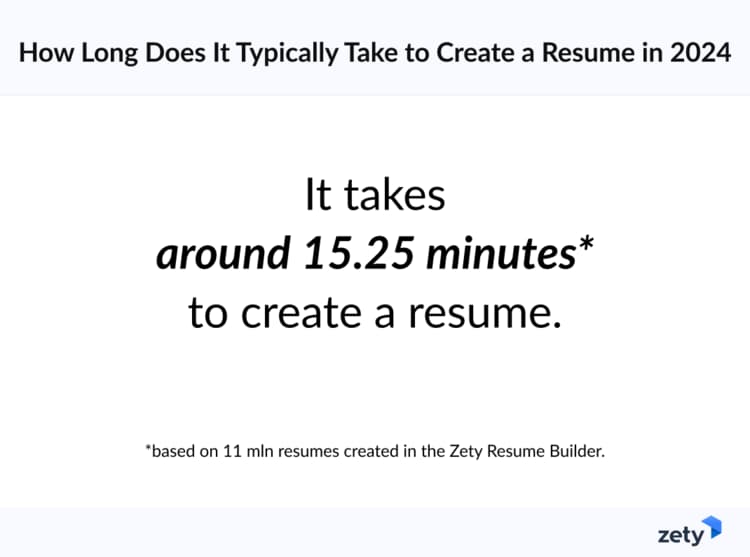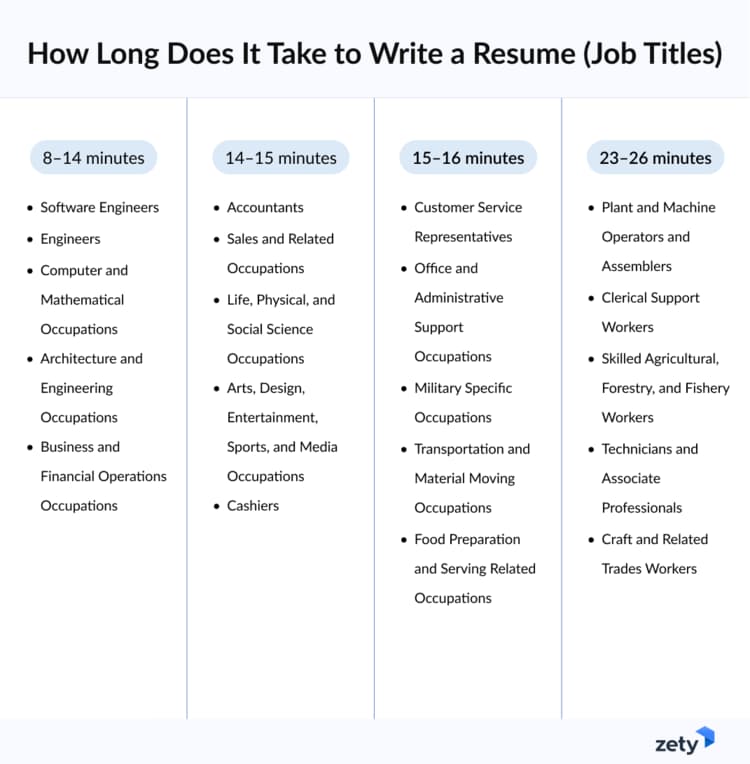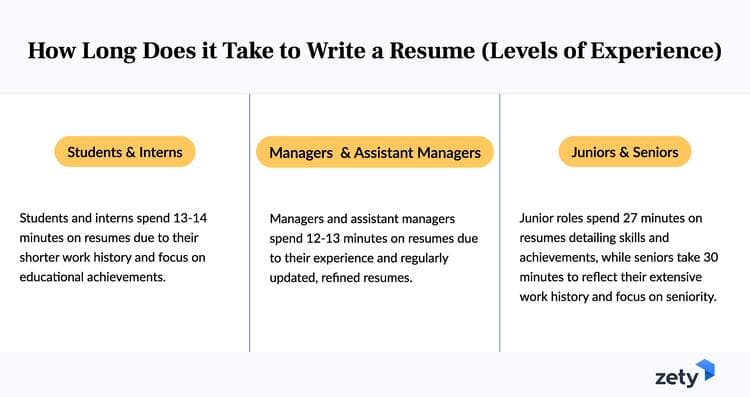How Long Does It Take to Write a Resume? Zety’s Study
Create Your Resume NowIt can be challenging to start working on your resume, especially if you’re not actively looking for a new job. There are always better things to do, right?
It can also be challenging to start updating it when there’s a great job offer on your hands. After all, you want to apply quickly and not waste more time polishing your application.
So, how long does it actually take to write a resume? We’ve studied tons of documents just to give you the right answers. Read on and find out!
How Long Does It Take to Write a Resume in 2025?
To answer that burning question, our team at Zety has analyzed over 11 million (sic!) resumes created in our builder. It turns out, on average, it takes 15.25 minutes to create a resume. That’s less than the average TED talk length on how to improve your happiness, change your life, or find what you love to do (and start doing it!). That's quick! But keep in mind that it's not the same for everyone.

How Long Does It Take to Write a Resume (Job Titles)
Let's see how these times vary across different job titles and sectors:
Fastest to Create (8–14 minutes)
- Software Engineers: 8.85 minutes
- Engineers: 10.50 minutes
- Computer and Mathematical Occupations: 11.2 minutes
- Architecture and Engineering Occupations: 13.8 minutes
- Business and Financial Operations Occupations: 14.2 minutes
As you can see from the podium, the fastest resume writers are those with strong computer skills. Engineers and people working in computer and mathematical occupations tend to have strong analytical and computer skills, possibly helping them understand how to use a modern resume builder even faster.
Moderately Timed (14–15 minutes)
- Accountants: 14.72 minutes
- Sales and Related Occupations: 15.0 minutes
- Life, Physical, and Social Science Occupations: 15.4 minutes
- Arts, Design, Entertainment, Sports, and Media Occupations: 15.7 minutes
- Cashiers: 15.86 minutes
This group includes a variety of professions that often require detailed and specific information to be included in their resumes. For instance, accountants and those in business roles need to clearly outline their technical skills and financial expertise, which can take additional time.
Longer Duration (15–16 minutes)
- Customer Service Representatives: 15.90 minutes
- Office and Administrative Support Occupations: 16.1 minutes
- Military Specific Occupations: 16.4 minutes
- Transportation and Material Moving Occupations: 16.5 minutes
- Food Preparation and Serving Related Occupations: 16.6 minutes
These roles often involve diverse skill sets and experiences that must be thoroughly detailed in a resume. Military personnel, for example, might need to translate their military skills into civilian terms, which can extend the time required. They also tend to write skill-based resumes, as this format clearly and concisely translates their achievements and past duties.
The Longest Times (23–26 minutes)
- Plant and Machine Operators and Assemblers: 23.8 minutes
- Clerical Support Workers: 25.0 minutes
- Skilled Agricultural, Forestry, and Fishery Workers: 25.9 minutes
- Technicians and Associate Professionals: 26.3 minutes
- Craft and Related Trades Workers: 26.8 minutes
Professions in these categories typically require extensive details about their technical skills, certifications, and extensive work histories. Craft workers and technicians, for example, often need to list numerous certifications and detailed job experiences to demonstrate their qualifications.

How Long Does it Take to Write a Resume (Levels of Experience)
The time spent on resume writing also varies significantly by professional level. Let’s take a closer look at some data:
- Managers: on average 12.67 minutes
- Assistant Managers: on average 12.93 minutes
- Students: on average 13.43 minutes
- Interns: on average 14.25 minutes
- Junior Roles: on average 27 minutes
- Senior Positions: on average 30 minutes
Assistant Managers and Managers and Assistant Managers
Managers and assistant managers spend around 12–13 minutes, the shortest from all the levels we’ve studied. These two groups of high-level professionals have more experience. Plus, they often have refined resumes that they’ve been updating regularly, which helps them reduce the time spent on each update.
Students and Interns
Students and interns typically spend less time on their resumes, averaging around 13–14 minutes. This is often due to their shorter work history and the need to highlight educational achievements rather than extensive professional experience. And those achievements, especially in the early stage of their careers, tend to be easier to pinpoint.
Junior and Senior Roles
Those in junior roles spend more time on their resumes, around 27 minutes, as they need to detail their skills and early career achievements. Senior professionals, on the other hand, with their extensive work history and numerous accomplishments, take about 30 minutes to ensure their resumes accurately reflect their expertise.

10 Reasons It Might Take You Longer (or Shorter) to Write a Resume
I’ve said it a million times: your resume is one of the most significant things you write in your entire life. Given that we spend around one-third of our lives working, this document needs to be written perfectly, even though your recruiter might not read it whole before inviting you over for an interview.
There are some reasons why writing your resume might feel as if it takes ages. Let’s see what they are:
1. Difficulty Starting
Sometimes, the hardest thing to do is to take a first step. Looking at a blinking cursor on a blank page can be intimidating and lead to procrastination. Many people delay the task, feeling overwhelmed by the need to present their careers in the best light.
2. Updating Your Resume
Not everyone starts their resume from scratch. Some people revisit it regularly to keep it updated. This helps you better track your most recent achievements and related numbers. Plus, it enables you to save some time and stress when you suddenly need to find a new job or come across an exciting job offer.
3. Rushing When Finding an Interesting Job Offer
When you find a job offer that seems like a dream come true, it’s only natural to want to finish or update your resume ASAP so as not to miss the opportunity of applying. This urgency, however, can lead to hurriedly written resumes, potentially missing key details or tailored information that could make a significant impact on the recruiters’ decision.
4. Lack of Practice
For those who don’t frequently update their resumes, the process can be slow. A lack of familiarity with online resume builders, resume formats, practical language, and how to highlight achievements can extend the time needed to create a compelling document.
5. Shortage of Time
Balancing job searching with your current job responsibilities, family, and personal life can make finding time to write a resume challenging. Many people find themselves squeezing this task into small, fragmented periods, which can either prolong the overall time spent or shorten it.
6. Stress-Induced Aspects
Writing a resume can be stressful, especially when one is pressured to find a job quickly. This stress can lead to difficulty focusing, making the process take longer as individuals second-guess their choices and wording. On the other hand, it can also lead to a quickly-written resume that feels finished but, in reality, is only a first draft.
7. Problem with Finding Quantifiable Achievements
Many people struggle to identify and articulate their accomplishments in a measurable way. This difficulty can extend the time it takes to write a resume as candidates try to recall specific metrics and achievements that effectively showcase their skills and impact.
8. Aiming for Perfectionism
Some individuals aim for perfection in their resumes, meticulously refining every word and formatting choice. This attention to detail can boost your chances of getting hired, but it can also significantly increase the time you spend on writing your resume.
9. Frequent Career Changes
If your work experience is very diverse or if you frequently change jobs or careers, showing your expertise understandably can be challenging and time-consuming. Candidates like that need to make sure that their resume tells a cohesive story relevant to the job they are applying for.
10. Tailoring for Specific Jobs
Customizing a resume for specific job applications can take additional time. Tailoring involves adjusting the content to highlight each position's most relevant skills, achievements, and experiences, which can significantly extend the resume writing process. Plus, when you tailor your resume, you also tailor your cover letter, which adds some time to the entire application process.
Understanding these challenges can help you strategically approach resume writing, ultimately creating more effective and polished resumes.
"It's not really important how fast you write your resume. Remember: This document can determine your professional life in the upcoming years. It's better to devote some extra time to making it perfect than to regret rushing over."
Conclusion
Creating a resume is a highly individual process that varies based on occupation, experience, and personal circumstances. While the average time is 15.25 minutes, it's important to focus on the quality of the resume rather than just the time taken. Whether you take 10 minutes or an hour, ensuring your resume accurately reflects your skills and experiences is crucial.
There is a clear correlation between the professional level and the time needed to write a resume. People in managerial positions tend to write resumes fast, possibly due to regularly updated resumes. They’re followed by students and interns, who highlight their education rather than professional achievements. It takes the longest for juniors and seniors to write their resumes, as they have had some relevant experience, and it’s more tricky to find out what to highlight most.
I won’t let you go without some tips. Review and update your resume regularly, even if you're not actively looking for new opportunities. This allows you to reflect on your achievements more accurately and effortlessly back them up with quantifiables since you have easier access to those numbers.
And while it truly doesn’t matter how long it takes you to write a great resume, what matters most is how well-prepared you are to do it correctly. So think it through, use the technology to make it easier, and take as much time as you need to create a job-winning resume.
Remember, there’s no better time to start working on your resume than now.
Share Your Insights
If you find this data helpful, interesting, or useful, don’t hesitate to share this article on your website and social media. This will help others gain more knowledge about the resume-writing process. It might also convince someone to start working on their resume. Please add a link back to this page so that I can see the impact of this study.
About Zety’s Editorial Process
Our editorial team has reviewed this article to ensure it aligns with Zety’s guidelines. We are committed to providing reliable, tailored career advice, which brings over a million readers to our site each year. Our team conducts original research to stay updated with the job market and is proud to be cited by top universities and media outlets worldwide.
